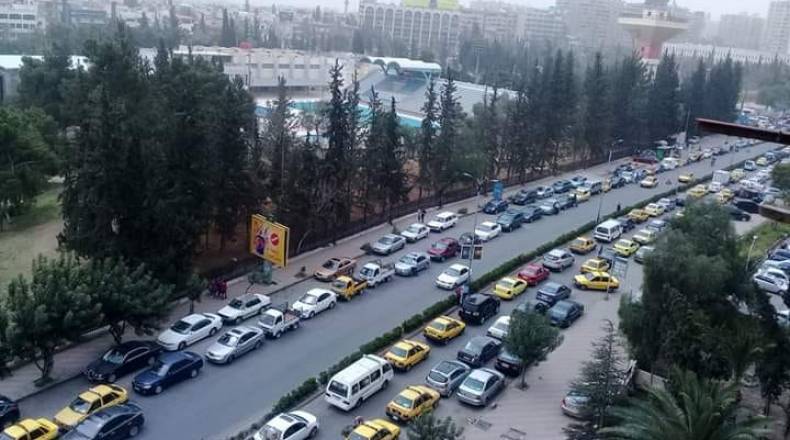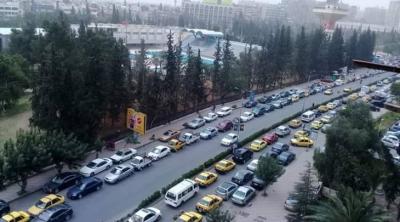Under the title "Syria: Gasoline 'Evaporates' and the Crisis Intensifies in Sweida and Hama," Sky News Arabia's website discussed the gasoline crisis in Syria, highlighting a notable rise in fuel prices across the country. The Ministry of Internal Trade and Consumer Protection has decided to raise the price of a liter of 95 gasoline at all stations to 2,500 Syrian pounds, up from 2,000 pounds, marking the second increase in four weeks. This surge coincided with a severe fuel shortage and is considered one of the worst crises for fuel derivatives in the country, particularly in the cities of Sweida and Hama. Last month, the ministry had set the subsidized gasoline price at 750 pounds and 2,000 pounds for 95 gasoline.
In Sweida, southern Syria, the city is experiencing near-total paralysis in transportation due to the strangling fuel crisis the province has been enduring for months. Local sources attribute this to a reduction in the province's fuel allocations and a significant rise in prices. A civil activist named Anas described Sweida as a "ghost town" due to the transport paralysis, making it impossible for students and employees to reach their studies and jobs.
Anas, 30, told Sky News Arabia that a liter of gasoline in the black market in Sweida is sold for 5,000 pounds (less than $2), forcing car owners to purchase it despite the high prices because their weekly gasoline allocations from fuel stations do not exceed 20 liters, which is an insufficient quota. He added, "Public transport fares are now priced at 2,500 pounds, and employees and students need 5,000 pounds daily for round trips, which totals 130,000 pounds ($45) monthly for transportation. An employee’s salary may only be 17 dollars a month."
Anas pointed out that many students are missing school because their families cannot afford transportation costs, especially larger families. He stated, "Each family with five students, including university students, requires 650,000 pounds ($224) monthly for transportation costs. This exceeds their living capacity, especially since Sweida is one of the poorer provinces relying on agriculture and suffering from water and rainfall shortages, in addition to the fuel crisis."
On another note, Shahab Al-Khateeb, a public taxi driver from Hama, stated, "The crisis has notably worsened after the Ministry of Oil decided to sell gasoline via a text message system for subscribers through the 'Wain' app associated with a specific station," where individuals must go to that station within three specified hours. Al-Khateeb complained that messages for refueling have been delayed for days, saying, "I haven't received a gasoline refill message for the last 15 days, like other drivers. We are forced to resort to the black market to buy a liter for 5,000 pounds to carry out our work, after our 20 liters of allocations run out. We are obliged to travel between cities and districts to transport students, employees, workers, and others."
The speaker noted that drivers are raising transportation fares to 3,000 pounds for public transport as they buy unrestricted gasoline sold at high prices, adding that "the crisis in Hama is not only due to the lack of gasoline at fuel stations but also the delay in receiving refueling messages for car owners."
In this context, a source in the fuel sector in Hama, who preferred to remain anonymous, denied on social media platforms the information circulating about raising refill allocations to 40 liters. The source confirmed to Sky News Arabia that the fuel allocations for stations would not change at this time, indicating that the delay in message arrivals is due to car owners choosing state stations over other stations, which do not have heavy traffic, leading to delays in message notifications.




